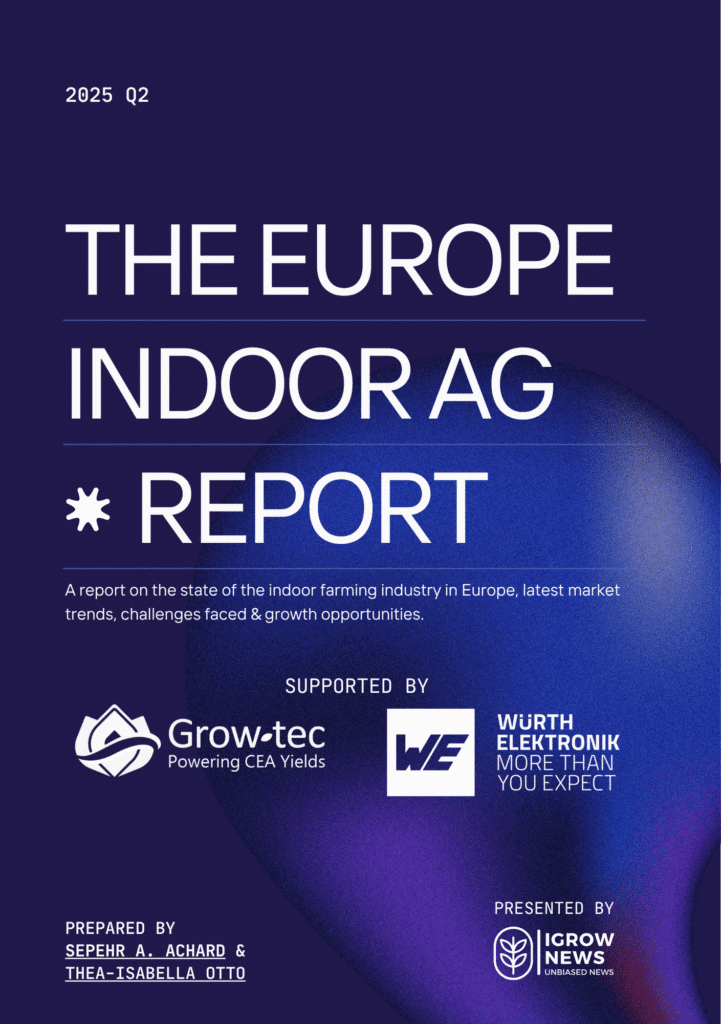Indoor Farming Report Hub: Market Intelligence for Vertical Farms & Greenhouses
Welcome to the official home of our industry-leading Indoor Farming Reports, where data meets decision-making in the rapidly evolving world of controlled environment agriculture. Each Indoor Farming Report, whether focused on vertical farms, smart greenhouses, or hybrid models, is built to equip industry professionals with insights that drive strategy and investment.
Our library includes specialized Vertical Farming Reports that analyze automation levels, energy costs, and scaling challenges, as well as comprehensive Greenhouse Reports covering smart irrigation, climate control, and high-value crop cultivation. From North America and Europe to the Middle East and beyond, these publications offer the clarity and depth you need to navigate the future of agriculture.
📘 Published Indoor Farming Reports
🇪🇺 Europe Indoor Farming Report
Published: June 2025, during GreenTech Amsterdam
The Europe Indoor Farming Report captures a pivotal moment in the European CEA market. Following a wave of startup bankruptcies and consolidation, the industry is now refocused on profitability, automation, and realistic scaling. This report maps out active operators, investment appetite, and regulatory landscapes across key European countries. It also features a comparative landscape of technologies, business models, and market access strategies.
Inside the Report:
- 22.2% CAGR forecast for indoor farming in Europe through 2030
- Case studies on surviving operators (e.g., IGS, GrowUp Farms, AVISOMO)
- Lessons from startup failures including INFARM and Agricool
- Expert commentary on CAPEX/OPEX balancing and automation trends


🇺🇸 USA Indoor Farming Report
Published: Q1 2025
The USA Indoor Farming Report offers a detailed overview of the controlled environment agriculture (CEA) sector in the United States. The report explores operational models, cost structures, and financing trends that shape indoor farming businesses nationwide. It also examines key players—from venture-backed vertical farms to greenhouse operators—and identifies factors influencing market consolidation and resilience.
Inside the Report:
- Regional investment data and facility heat maps
- In-depth interviews with C-suite executives
- Financial benchmarks and ROI projections
- Coverage of robotics, climate control, and AI applications
🔜 Upcoming Reports
🌍 Middle East Indoor Farming Report
Planned Release: Q3 2025
This upcoming report will provide the most comprehensive review to date of indoor farming activities across the GCC region. From container farms to government-backed megaprojects, the report will explore how the Middle East is turning food security goals into practical strategies using vertical farming, hydroponics, and hybrid models. It will also evaluate the role of sovereign funds, off-grid systems, and partnerships with international suppliers.
Read more information about The Middle East Indoor Farming Report.
🌱 Global Indoor Farming Trends Report
Planned Release: Q4 2025
This report will investigate the transformation underway in global horticulture, particularly how precision farming, biological inputs, and greenhouse automation are impacting growers across North America, Europe, and emerging markets. It will also provide a detailed look at high-value crops, smart irrigation tools, seedling technologies, and the expansion of horticultural exports.
Read more information about The Indoor Farming Trends Report.
Interested in taking part in any of these reports? Contact us today!
Discover our other AgTech reports here.
🧭 Why These Indoor Farming Reports Matter
Each Report is developed with rigor and market relevance in mind. Here’s what makes them stand out:
- Expert-led Analysis: Built on 150+ hours of interviews and research
- Segment-Specific Insights: Tailored to vertical farming, greenhouses, and hybrid models
- Business-Ready Data: Use in decks, grant applications, and board decisions
- Industry Coverage: Featured across iGrow News, podcasts, and newsletters
📬 Stay Informed
Get notified when new reports go live and receive exclusive previews and expert analysis.
